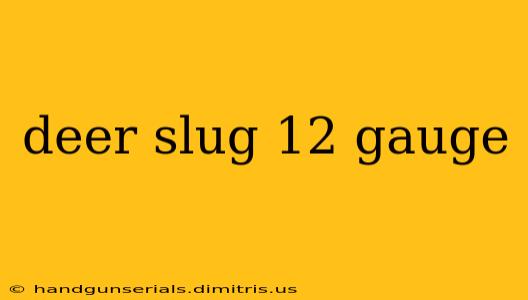The 12-gauge shotgun, a mainstay in the hunting world, offers a versatile platform for various game, including deer. However, successfully harvesting deer with a 12-gauge requires careful consideration of ammunition selection. This guide delves into the world of deer slugs for 12-gauge shotguns, exploring different types, their effectiveness, and crucial factors to consider for a safe and ethical hunt.
Understanding 12 Gauge Deer Slugs: Types and Ballistics
Several types of 12-gauge deer slugs are available, each with unique ballistic characteristics impacting accuracy, range, and penetration. Choosing the right slug depends on your hunting style, firearm, and the specific hunting conditions.
1. Rifled Slugs: Precision and Range
Rifled slugs are designed with grooves that impart spin, enhancing accuracy and extending effective range. These slugs are typically more expensive but offer superior precision compared to other types. Their higher accuracy makes them ideal for longer shots, where precise placement is crucial for a clean kill. Key features: increased accuracy, extended range, flatter trajectory.
2. Foster Slugs: A Classic Choice
Foster slugs are a more traditional design, featuring a round, smooth body. While not as accurate as rifled slugs at longer ranges, they are generally less expensive and can be effective at closer ranges. They are often favored for their reliability and are suitable for hunters prioritizing affordability. Key features: cost-effective, reliable, suitable for shorter ranges.
3. Sabot Slugs: Bridging the Gap
Sabot slugs combine the accuracy of a rifled slug with the versatility of a smoothbore barrel. These slugs feature a smaller diameter projectile encased in a plastic sabot (sabot being a French word meaning "shoe"). The sabot allows the slug to be easily loaded into a smoothbore barrel while still providing the benefits of a rifled projectile. Key features: accuracy in smoothbore barrels, good range and penetration.
4. Brenneke Slugs: Deep Penetration
Brenneke slugs are known for their deep penetration, making them suitable for thicker-skinned game or shots where maximum penetration is desired. Their design often incorporates a plastic wad at the base for better performance in various barrel lengths. Key features: deep penetration, often used for larger game.
Choosing the Right 12 Gauge Deer Slug for Your Needs
Selecting the appropriate 12-gauge deer slug involves careful consideration of several factors:
1. Shotgun Barrel Type: Rifled vs. Smoothbore
The type of barrel on your shotgun significantly influences slug selection. Rifled barrels are designed for rifled slugs, while smoothbore barrels can accommodate Foster, sabot, and sometimes specialized slugs. Always check your shotgun's specifications to ensure compatibility.
2. Range and Accuracy Requirements
If you anticipate taking longer shots, rifled slugs or sabot slugs are usually the best choices due to their enhanced accuracy and flatter trajectory. For closer-range hunting, Foster slugs might suffice.
3. Penetration Needs
For larger game or shots through dense cover, slugs offering deep penetration should be prioritized, such as Brenneke slugs.
4. Budget
The cost of ammunition can vary considerably between different slug types. Weigh the performance benefits of higher-priced options against your budget.
Safety and Ethical Hunting Practices
Using a 12-gauge shotgun for deer hunting requires responsible gun handling and ethical hunting practices:
- Practice and sight-in: Accurately zeroing your firearm before the hunt is crucial for safe and ethical hunting.
- Know your range: Understanding your effective range with your chosen slug is paramount for making accurate and humane shots.
- Shot placement: Aim for vital organs to ensure a clean kill. Poor shot placement can result in wounded animals.
- Follow all local hunting regulations: Adhere to all applicable laws and regulations regarding deer hunting in your area.
Conclusion: Making Informed Choices
Selecting the best 12-gauge deer slug requires careful consideration of various factors. By understanding the different types of slugs available and assessing your individual hunting needs and conditions, you can ensure a successful and ethical hunting experience. Remember, safety and ethical hunting practices should always be your top priorities.

